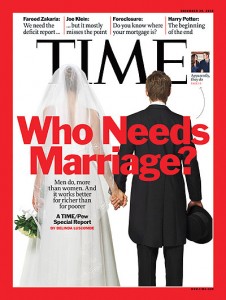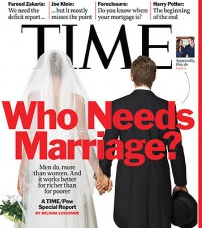Marriage may be slowly inching its way out of style, according to a new survey.
The survey conducted by the Pew Research Center last month found that of the 2,691 Americans surveyed, 39 percent thought marriage is becoming obsolete, up from 28 percent when Time magazine asked the same question in 1978.

There are many ideas about why this change may be occurring in the U.S.
“The bottom line is that the reason we marry now is for love,” marriage and family psychology professor John Buri said. “So, if that’s the only reason people are marrying, then I’m not sure marriage is necessary.”
The Rev. Erich Rutten said, “Marriage is not easy. There are a lot of people who have grown up with parents who have been divorced.”
Rutten said more people are saying marriage is obsolete due to cultural changes.
“Society, I think, has a different idea of what marriage is,” Rutten said. “It’s about what I can get out of it rather than really what I can put into it.”
Another reason could be how easy it is to get a divorce. It’s harder to fire somebody than it is to get a divorce, Buri said.
“There is not another area in the culture where you take a contract and allow one person, one side of the contract, to unilaterally break the contract and get away with it, except for marriage,” he said. “You have that kind of culture and it’s going to change the way people look at marriage.”
The survey did oversample adults who were divorced or separated, living with a partner, or had never been married and were not currently living with a partner.
Despite survey results, many St. Thomas students seem to still see marriage as an important part of life.
“I don’t think it’s obsolete,” sophomore Kameron Kantor said. “I feel that a lot of people still want the security and the benefits of marriage, legally and emotionally.”
Sophomore Kayla Stinson agreed.
“I think that pretty much every girl has thought about her wedding day at least to some extent,” she said. “I don’t think many girls are willing to give that up easily.”
St. Thomas graduate student Callie Knudslien said many people’s misconceptions about marriage may be based off media and pop-culture portrayals of marriage.
“There is more of an attitude where things like marriage and relationships are just based on ‘I do it as long as it feels good and when it no longer feels good, it no longer is good,’” she said.
Despite Americans’ changing feeling toward the institution of marriage, the survey also found that compared to other aspects of American culture, Americans are pretty optimistic when it comes to marriage.
“People have greater faith in marriage and family (67 percent) than they do in our educational system (50 percent) or our economic system (46 percent), or our system of morals and ethics (41 percent),” Buri said.
The divorce rate in the U.S. is approximately 50 percent, and last year alone 42 percent of all children born in the U.S. were born to women who were not married, Buri said. But he added that marriage won’t disappear any time soon.
“Is marriage the only way that we can find love? No. As a matter of fact, it might not even be the best way,” Buri said. “But in terms of the stability it provides the culture, no, it’s not obsolete at all.”
Colleen Schreier can be reached at schr1207@stthomas.edu.
This article was corrected at 12:30 p.m. Nov. 29. The article originally said the survey sampled unmarried people, but it should have said it oversampled unmarried people.


I’m waiting for a gay marriage debate to begin here. Don’t fail me, TM.
I am surprised, perhaps amazed that, at a Catholic institution of higher learning of the quality of UST, that Ms. Schreier didn’t think it important enough to at least mention the teaching of the Catholic Church on marriage. The Pew Research Center obviously doesn’t care enough about what Catholic teaching is but it would seem that a reporter at a Catholic school might care enough to at least explain it in such an article. Even the priest is not quoted with such an explanation, although I cannot imagine him not making it clear when interviewed. Perhaps this reporter should pay more attention in Theology and journalism class.
I complete agree, Dick. Why aren’t St. Thomas journalism classes teaching students to incorporate Catholic teaching into their stories?
I’m sure UST’s journalism classes are wrongfully focusing on the abstract ethical ideal that journalists should act independently when they really should be teaching students to represent Catholic teaching in all TommieMedia stories.
For instance, I was appalled to see the unabashed endorsement of consumerism in the story titled, “Students overflow online shopping carts.” The story should have shunned these student heathens who think material pleasures are what life’s all about. Don’t they know that greed and material possessions won’t get them into heaven? The writer should have informed students that this is not what the Catholic Church teaches. Now, there’s likely nothing stopping their path straight to heck.
@Dick:
No disrespect in regard to your views, but I think many people are already aware of the Catholic Church’s teaching regarding marriage. Even though this is a Catholic institution, not everyone is Catholic, religious, or dare I say…a Christian.
I’m with M. Houck on this one. Talking about Catholic teaching in a news article about a major socio-religious topic with an overwhelmingly religious, predominantly Catholic audience is just plain good journalism. (At the very least, that perspective would help to differentiate it from the AP’s version. Right now it’s pretty much identical, only skimpier.) Which is not to say that it was a badly done article — it just could have been better in this respect. Todd’s sarcasm is uncalled for.
As for the article itself… well, what do you expect when you have a culture of divorce, fornication, cohabitation, and contraception? When there’s a powerful ideology that claims anyone should be able to marry “the people they love” regardless of orderedness toward child-bearing and child-rearing? When marriage is viewed as a “contract”, in Dr. Buri’s words, rather than an act of complete, charitable, lifelong self-giving? If marriage is nothing more than a public declaration that I am having great (sterile) sex with somebody, and that I hope to continue that arrangement for as long as possible, plus an expensive party, then YES, marriage IS obsolete!
Fortunately, deep down, almost all of us know better. We’ve lost our moral vocabulary, not our moorings.
…
That’s right, James! We all need to remember the true purpose of marriage and sex: increasing the surplus population.
Amen Chris Huber! Also, who cares about the Catholic perspective? Just write a good, unbiased article for God’s sake!
I’ve never met a single human soul I would describe as “surplus.”
james, are you saying that i shouldn’t get married just because i don’t want kids? or not have sex at all?
All this, of course, is a wild digression for the *profoundly* callous view taken of human life earlier in this thread. I think those comments point all the more clearly to the damage we’ve done by treating children (and human life generally) as a disease to be prevented, or as a pesky competitor I’m bound to respect under the social contract, rather than as a *gift* to be *cherished*. The phrase “surplus population”, with its deliciously eugenic echoes, says more in two words than I could write in two thousand about the intrinsic philosophical link between the anti-marriage movement and the culture of death it (sometimes unwittingly, sometimes *very* wittingly) warps.
At this point, I would normally interject humor to distract everyone from the fact I just broke the heck out of Godwin’s Law, and also from the fact that I have apparently taken up the Mike Blissenbach Endowed Chair of TommieMedia Comment Holy Rolling and Pope-Quoting. But nothing funny comes to mind, so, instead, learn some internet culture and look up ol’ Godwin if you haven’t heard of it before (http://www.faqs.org/faqs/usenet/legends/godwin/), and I’ll give myself a typically self-congratulatory pat on the back for a particularly deft use of praeterition.
Lucy, you ask an interesting but complex question. It deals with matters of sexual morality, civil policy, and, of course, that bogeyman Old Timey Religion. Needless to say, there’s not space here to unpack everything you asked and address it from all those angles. As regards my personal moral beliefs, I believe celibacy outside of marriage, an open orientation to children within marriage, and a fundamental respect for the integral dignity of the body are all vital to human flourishing. We’ve lost that, in so many ways, and that loss has (clearly!) fueled the expanding crisis of marriage and the family.
But my moral beliefs don’t answer your question.
As regards civil law, I answer that: (minimally) if you have an active desire to NOT procreate, will NOT adopt, and will take active measures to DISABLE the procreative aspects of your sexuality, then the municipal, state, and federal governments have no business awarding your sexual relationship any special recognition or privileges. A long-term relationship of deliberately sterile sex is not marriage; it is friends with benefits. Do as thou wilt, but there is no state interest in promoting or protecting friends with benefits.
Fair enough?
that makes sense james. why should the government grant any special recogntion to people who don’t want to advance the interests of the state by reproducing? i mean, what are children if not future human resources? besides, letting people marry just because they are in love would surely violate the interests of the catholic church, which as we all know is the foundation for good government.
I think Lucy was going for absurdity there, but I missed it…
Also, I support James in his new position of Chair of TommieMedia Comment Holy Rolling and Pope-Quoting.
James, I think you might find this interesting (even if I think you will disagree with the ultimate thesis presented): http://thepietythatliesbetween.blogspot.com/2010/11/does-same-sex-marriage-radically.html
Thanks for that, Kathryn. It’s a good article, and it raises what I think are valid objections to the claim (very common on my “side”) that marriage as understood by religion and marriage as understood by the State are precisely the same thing. They aren’t. The state’s primary interest is reproductive, period. Religion’s primary interest varies a lot depending on denomination, but NO church (including the Catholic Church) makes reproduction the sole primary interest of marriage. The author’s “covenantal view” of marriage makes little sense in the context of civil law, but in a religious context it’s a vital part of the conversation.
Oh, now you’ve gone and got me all excited about ideas again. :P Anyhow, thanks.